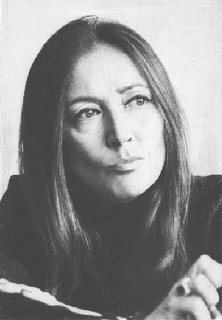Oriana Fallaci dies at 76

"I sat at the typewriter for the first time and fell in love with the words that emerged like drops, one by one, and remained on the white sheet of paper ... every drop became something that if spoken would have flown away, but on the sheets as words, became solidified, whether they were good or bad."
ROME (AP) -- Oriana Fallaci, a veteran journalist and writer best known for her abrasive interviews and provocative stances, has died, Italian news reports said Friday. She was 76.
Fallaci, who had been diagnosed with cancer years ago, died in a Florence hospital, the Italian agencies ANSA and Apcom said. The reports said that she had been hospitalized for days.
The Rizzoli publishing house, which published her books, could not immediately confirm the reports.
Fallaci, a former Resistance fighter and war correspondent who was hardly seen in public, had lived in New York for years.
During her journalistic career she became known for uncompromising interviews with such world leaders as former U.S. Secretary of State Henry Kissinger and the late Palestinian leader Yasser Arafat.
Her work - both interviews and books - was translated around the world.
''Fallaci's manner of interviewing was deliberately unsettling: She approached each encounter with studied aggressiveness, made frequent nods to European existentialism (she often disarmed her subjects with bald questions about death, God, and pity), and displayed a sinuous, crafty intelligence,'' The New Yorker wrote in a profile this year entitled ''The Agitator.''
Fallaci's recent publications drew accusations of racism and inciting hatred against Muslims. They include the best-selling book ''The Rage and The Pride,'' which came out weeks after the Sept. 11 attacks and found a large audience in Europe.
In the book, she wrote that Muslims ''multiply like rats'' and said ''the children of Allah spend their time with their bottoms in the air, praying five times a day.''
A group in France unsuccessfully sought to stop distribution of the book, while two other associations have requested that it carry a warning.
Her next essay, ''The Strength of Reason,'' accused Europe of having sold its soul to what Fallaci described as an Islamic invasion. It also took the Catholic Church to task for being what she considers too weak before the Muslim world.
Describing Europe as ''Eurabia'' - a mix of Europe and Arabia - Fallaci said the continent ''has sold itself and sells itself to the enemy like a prostitute.''
''Europe becomes more and more a province of Islam, a colony of Islam,'' she wrote.
The current invasion, Fallaci went on to say, is not carried out only by the ''terrorists who blow up themselves along with skyscrapers or buses'' but also by ''the immigrants who settle in our home, and who, with no respect for our laws, impose their ideas, their customs, their God.''


Sem comentários:
Enviar um comentário